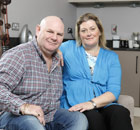
The UK property market is firing on all cylinders, according to reports. “Buyers are flooding back into the market” said the Times. “Buy-to-let fuels property boom” headlined the Guardian, while the Financial Times led with “July house prices top 2008 peak”. But what are the real experiences of buyers and renters across the UK?
Guardian Money today features seven people behind the statistics. Yes, some are selling their homes at huge prices in a matter of days, but others are waiting months. Some young people are making their first steps on to the fabled property ladder, but other families, particularly in high price areas, fear they may be trapped by the renting “snake” for life.
According to the Nationwide price index, only in London have properties returned to – and surpassed – their 2007 peak. “There’s been a notable divergence across the regions,” says Nationwide’s chief economist Robert Gardner. He says while London and surrounding areas are powering ahead, prices in Northern Ireland remain 50% below their pre-crisis levels.
“It is hard to be precise about what is driving the difference because a lot of the regional data comes out with quite a lag,” he says. “London remains quite an attractive destination for overseas investors – sterling is still weak against some currencies and it is still regarded as a safe haven for cash.”
The signs of recovery are being welcomed by those struggling to sell, but they are bad news for anyone still trying to get a foothold in the market.
Top mortgages
Find the best deals on the market
Today’s best rates
- 1.49%HSBC
- 1.64%Chelsea Building Society
- 1.69%HSBC
Compare
Provided by London & Country for the Guardian
According to Shelter, the Bank of Mum and Dad has stepped in where other lenders have feared to tread, putting almost £2bn a year into the market. But not all parents can help, so others have to look for different solutions.
For those with small deposits, the government has launched Help to Buy, offering hope to those with just 5% to put down. However, while the first part, which offers an interest-free loan on newbuild properties, has been welcomed and credited with helping the construction sector make some headway this year, commentators are warning that the second part could spark another boom and bust.
Meanwhile, the large number of people trapped into renting, rather than buying, report high levels of concern about letting agents and landlords
According to the “Tenant’s Voice” website, thetenantsvoice.co.uk, “half of UK renters report bad experiences with landlords or letting agents”.
Four in 10 tenants said properties were generally tired and in need of updating, with 17% saying they were dissatisfied, or very dissatisfied, with overall conditions.
There remains widespread concern that Britain is simply not building enough houses. Shelter says the UK needs to build 250,000 homes every year just to meet current needs, let alone tackle the backlog. Yet in England, we are building less than half of that. Shelter predicts that despite evidence of a recovery in mortgage finance and transactions, home ownership will continue to decline in the UK.
Kevin in Balham, south London: ‘We sold our £1m home in days’
Engineer Kevin and his wife to sell their four-bed Victorian terraced house in Balham, south London, for just over £1m – double the price they paid for it only nine years ago. Unlike other parts of the UK, where the market remains stagnant, their part of London is seeing homes snapped up in a matter of days.
“We wanted to move somewhere with a bigger garden and we thought we would have to move out of London to get it. Then my wife saw a place nearby,” says Kevin, who runs his own recording studio. “We looked at it on the Saturday and put an offer in immediately. It was accepted on the Monday. But our own house wasn’t on the market yet, so we frantically tidied it up on the Sunday.
“We had the house photographed on the Tuesday and it was online on the Wednesday. We used the same estate agent we were buying through. Nine or 10 couples came to see it within three days and one of them took it – they made an offer over the asking price. “If things are reasonably priced – not reasonably, because they are absurd – if things are realistically priced, they seem to go quickly.”
The couple and their daughter have moved around the corner to a home with a larger garden and more space. Kevin says: “We bought the house in Balham for £525,000 in 2004, using money from the sale of our first house. It needed fixing up, so over the years we’ve done everything we could possibly do to it. We’ve done all the work at weekends – we’ve not had builders in – so we’ve probably only spent around £75,000 to £100,000 on it.
“Through pure fluke we have been able to buy and sell at good times and ended up buying in the right place. When we bought the house we didn’t have a child and knew nothing about catchment areas, but it turned out to be in the catchment for a very good school. Since we moved here we’ve had 10-plus letters a month from estate agents and families saying please consider us if you ever want to move.
“There’s more demand than there are properties and I can’t really see that changing. Even in 2007-08, prices didn’t drop here – they just grew more slowly. I don’t worry about what happens, though – we’re not developers trying to turn a quick buck. This is our family home. We’ve just been incredibly lucky to buy here.”
Stephen in Silsden, West Yorkshire: ‘Our five-bed has been on the market for a year’

In contrast to the booming London market, selling conditions in many parts of the UK are sluggish. Stephen Murphy has been trying to sell his home in Silsden, West Yorkshire, for more than a year. Even after he cut the price and switched agents, viewings have been thin on the ground.
He says: “I put it on the market in May last year and, initially, I thought it would sell fairly quickly. One or two houses have sold since mine went on, but not much is happening. We’ve only had about six people come and view it. The feedback we’ve had from visitors is that it is a lovely house but they are not in a position to buy at the moment.
“We’ve reduced it in a couple of chunks and I have changed estate agents – originally I was with a local agent but I moved to one with more branches. I’ve asked for different photos to be taken, and for them to switch the order of the pictures on Rightmove to attract viewers. I’ve thought about taking it off the market for maybe six months, but it’s quite hard to get good advice on the best thing to do.
“I think it is at the top end of properties in the area. I keep hearing thatfirst-time buyers are coming back and I’m hoping that will help things move further up. However, now that the Bank of England has said interest rates are unlikely to move I’m worried that will mean more people getting interested in buy-to-let, and they will push first-time buyers out. If that happens, there will be no one moving up.”
Michael and Julia in Woking, Surrey: ‘We’re doing buy-to-let for first time’

Buy-to-let investors are pouring back into the property market, according to figures last week. Lending to landlords topped £5bn in the past three months, with more than one in 10 loans now handed to a would-be landlord, while first-time buyers are still struggling to get on the housing ladder. But many new buy-to-let investors, such as Michael and Julia Saw from Woking, say they have no choice given the desperately poor returns from savings and record lows in annuity incomes.
The couple bought a two-bed flat at a Barratt Homes development in Woking for £250,995 as their first foray into buy-to-let, financed by an inheritance Michael recently received. They have had tenants in since January, earning them around £1,000 a month in rent, and they hope to make a profit when they eventually sell the property.
“Pensions are looking pretty grim whichever way you look at it”, says Julia. “We hope to benefit from future capital gains, and the monthly income the rent provides us with. There was no way that a bank account could have provided us with this sort of return. I have no doubt our investment will help to relieve financial pressures in the future and means that we will always have something to fall back on.”
Barratt offered the Saws an “investor pack”, covering the first three years of letting agent costs, service charges, ground rent and landlord insurance. “We didn’t even look anywhere else. As this is the first property we have bought, we didn’t want to have lots of maintenance costs or repairs. Buying ‘new’ meant it was ready to go and that we could get a good rent with minimal effort on our part. So far it’s worked out very well for us.”
Susan in Kirkintilloch, near Glasgow: ‘You can be in your twenties and buy – just not London’

First-time buyers are flooding back into the market, according to some reports, with more 95% deals available – although the numbers remain subdued compared to pre-crisis levels.
Many young adults have given up on buying a place of their own as prices move further out of reach. But Susan Nicol, 27, has bought her first home, with the deposit funded entirely from her own savings. The trick is not to pay London prices.
Nicol, who works for the Medical and Dental Defence Union of Scotland, bought a two-bedroom flat in Kirkintilloch, just outside Glasgow, for £85,000 in May this year. To raise the 5% deposit needed, she decided to move back in with her parents.
“I had been renting for a couple of years, sharing flats and paying about £300 a month. I knew the only way I was ever going to save enough was to move back home, so I asked mum and dad. They are not in a situation where they could give me money, but they were able to let me live at home without paying – they’ve also done most of the wallpapering in my flat.
“I moved in with them last summer and gave myself a six-month target to save as much as I could.
“I put the money I had paid in rent and bills into a savings account and four days after my deadline I made an offer. It is great to have my own space.
“My parents are very laid back, but it was quite hard going back to getting daily texts asking if I had a key to get in!”
Jim, Lara and Eva in Brighton: ‘Will our family be forced to rent for ever?’

Jim Griffin, 36, his partner Lara Barnes, 41, and daughter Eva, three, are typical of a new generation of families with a decent income but who live in areas where rising prices mean they are trapped into renting.
Griffin, who works for the Guardian as an assistant production editor, says: “We have been renting in Brighton for four years. We’re lucky to have had a good experience – the landlord is always responsive and the lettings agent is OK, too (apart from the ridiculous fees to simply extend our tenancy each year). We spend £1,125 a month on a two-bed flat. So alongside nursery costs for Eva – which are almost like a second mortgage (only problem is we don’t have a first mortgage) – it is difficult to save for a deposit.
“With prices as they are down here we would need a pretty big deposit. I work in London and Lara works at one of the universities locally. We can’t really move somewhere significantly cheaper or we would both have a big commute, which isn’t feasible with nursery opening times.
“We met in our 30s so having Eva was more time sensitive than buying a house, and, as neither of us previously owned a property, we had no equity to put towards a place. Starting a deposit from scratch is very hard, and you find yourself playing a never-ending, futile game of catch-up as house prices continue to rise out of reach.
“We’ve definitely given up on buying a family home down here, but we hope to be able to get a maisonette or flat or something and then see where we go from there. The January portion of the Help to Buy scheme is intriguing, so we’ll wait and see what deals are on offer after its launch.
“Whatever they are I’m guessing it will be more expensive than renting, but I’ve a feeling that if we miss this boat, that’s it – a lifetime of renting.
“I have no desire to make money out of buying a house. I simply don’t want to be handing over thousands a month in rent when we are retired.”
Catherine and Nikolai: ‘We got £146,000 home, with £7,500 deposit’

property ladder, the government proclaimed this week, and nurse Catherine McClean, 26, and Nikolai Ivanovic, 25, a former Queen’s Guard, were the first to complete a purchase under the scheme. They used the interest-free loan to help buy a three-bedroom semi-detached home in Prescot near Liverpool.
McClean says: “We were looking for a place in Northern Ireland where I’m from but nothing was coming up that was suitable. It needed to cost less than £100,000 as we were going to have to raise a 10% deposit. It was proving difficult so we looked online, with the thought of coming back to England.
“We ended up on the Taylor Wimpey website where we saw a house near Newton-le-Willows where Nik’s mum lives. We fell in love with it from the pictures, then found that because of Help to Buy we could buy it with just a 5% deposit. We had enough, so we phoned up about it. It was the only one left so we had to decide very quickly. We went into it blind – we hadn’t even seen the property when we bought it.
“It was £146,000 and we needed just £7,500 to pay for it – both Taylor Wimpey and our lender Halifax were doing an offer where they would pay for stamp duty. We could have carried on saving but it would probably have taken a year and we were living with my dad, living off Nik’s wages and saving mine.
“We came back to England on 23 April and we went to see it. That was when it actually hit – we’ve just bought a £146,000 house and we haven’t seen it. I wouldn’t have done so if it hadn’t been a new-build.
“We’re planning to stay here for at least 10 years. We’ll probably keep it after that because it has great rental potential: it’s less than a mile from the hospital and next to the train station. Hopefully we can work our way up the housing ladder.”
Ben and Kristi: ‘We bought – thanks to the Bank of Mum and Dad’

More than a quarter of first-time buyers are dependent on their parents to stump up cash to help them buy a home, according to housing charity Shelter, a figure that has risen sharply since the start of the financial crisis as banks have demanded much higher upfront deposits.
Ben Ford, a 26-year-old teacher, and Kristi Collard, a TV researcher, are perhaps typical of those reliant on the Bank of Mum and Dad. The couple are buying a flat in Peckham, south London, with the help of both sets of parents. Ford says: “The building society told us we needed a 10% deposit – £25,000 because of the high price of properties in the area. Our parents said they would help and gave us the deposit. I had saved up about £3,000 which has gone on all the fees. My mother helped my older brother pay off his student loan and she had always said she’d do the same for me. When I graduated my debt was standing at £30,000 and there seemed little point paying off some of it and racking up interest on the rest, so she agreed to give it to me to help me buy a house.
“At Christmas, Kristi’s parents said they might be able to help, too, as they were about to sell the family home and downsize. They were all keen to help because we were spending so much on rent. I wanted to get away from putting money into a black hole.
“We’ve found a garden flat in Peckham. The decision about what property and where, was completely left to us. It’s a conversion in a period property. We did look at new-build flats but on some you needed a 20% deposit and even with our generous parents we didn’t have enough. There were some on offer through Help to Buy but they didn’t have a garden.
“Amongst our friends only one or two have been able to buy. People are surprised when I say I have.”
http://www.theguardian.com/money/2013/aug/17/tales-from-property-market
Disclaimer
This article is provided as a guide. Any information should be used for research purposes and not as the base for taking legal action. The Tenants' Voice does not provide legal advice and our content does not constitute a client-solicitor relationship.
We advise all tenants to act respectfully with their landlords and letting agents and seek a peaceful resolution to problems with their rented property. For more information, explore the articles in our category.
The Tenants' Voice works in conjunction with Deposit Recovery Claims to assist tenants.
For more ways to reach us, please visit our contacts page.




